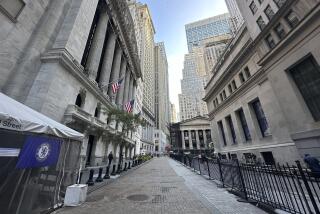Investors await outcome of European Union emergency meetings
- Share via
Investor anticipation is building ahead of meetings in Europe on Thursday and Friday that are being billed as a possible turning point for the continent’s bruising economic crisis.
In advance of the emergency meetings among leaders from all European Union nations, French leader Nicholas Sarkozy and German leader Angela Merkel wrote a joint letter Wednesday saying that “steps need to be taken now without further delay.”
Stock trading has nearly ground to a halt this week, with major stock indexes barely budging, as investors wait to see what Europe’s next move is. Analysts and politicians warn that failing to stem the government debt crisis could put the future of the euro currency in doubt.
Sarkozy and Merkel sought to buck up the optimists by laying out a plan for tighter fiscal integration of the European Union, which could allow Europe to turn toward recovery rather than crisis management.
“There is a lot of anticipation about Friday’s meeting,” said Tim Ghriskey, chief investment officer at Solaris Group. “These are issues that do have to be addressed, and sooner rather than later.”
As investors have waited, single statements from even anonymous European officials have had the power to move the markets. European markets closed lower Wednesday after a German official tried to rein in expectations for Friday’s meeting in Brussels.
“I have to say today, on Wednesday, that I am more pessimistic than last week about reaching an overall deal,” Reuters reported the anonymous official saying.
Later in the day, though, comments from anonymous officials connected to the European Central Bank helped push many U.S. stocks into positive territory.
The Dow Jones industrial average closed up 46.24 points, or 0.4%, at 12,196.37 on Wednesday. The broader Standard & Poor’s 500 index rose 2.54 points, or 0.2%, to 1,261.01. However, the volume of stock trading was down as most investors waited before placing any bets.
The crisis in Europe has reached many apparent breaking points in the past, particularly when it appeared that Greece might be headed toward default. But Greece is one of the monetary union’s smallest members, and the crisis has recently spread to bigger economies such as Italy and Spain.
The credit rating company Standard & Poor’s helped increase the sense of urgency with its warning Monday that it may downgrade the credit ratings of 15 European countries if some solution is not reached.
The Obama administration has tried to push the talks along by sending Treasury Secretary Timothy F. Geithner to Europe.
“We are very encouraged with the progress that is being made,” Geithner told reporters Wednesday.
In advance of the EU gathering Friday, European Central Bank officials are meeting Thursday to consider steps they might take to help the situation. But while the bank could lower interest rates to help boost the continent’s economy, bank officials have said they would not pull out their big guns until a more comprehensive fiscal agreement is reached.
For Friday, the plan laid out by Merkel and Sarkozy would lead to a more integrated European Union in which members could be punished if they run big deficits or lack fiscal discipline. This has been met with some skepticism because it could require approval from parliaments of all member nations, which would be hard to secure.
Other plans would make tweaks that would not require that sort of ratification.
Michael Purves, chief market strategist at BCG Financial, said he was not expecting a final solution before the weekend, but he said an end game was coming into sight.
“There are all sorts of things going wrong, but the chances of something really bad happening decline more and more,” Purves said.
More to Read
Inside the business of entertainment
The Wide Shot brings you news, analysis and insights on everything from streaming wars to production — and what it all means for the future.
You may occasionally receive promotional content from the Los Angeles Times.










